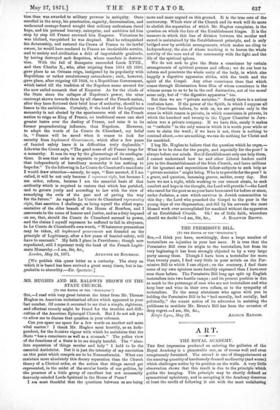MR. HUGHES AND MR. BALDWIN BROWN ON THE STATE CHURCH.
[To rim Roam or TEE "SrEarAroa.1
read with very great interest the letter from Mr. Thomas Hughes on American ecclesiastical affairs which appeared in your last number. Of course it occurred to me that a simple, righteous, -and effectual remedy might be found for the troubles and diffi- -cultie,s of the American Episcopal Church. But I do not ask you cto allow me to discuss that question in your columns.
Can you spare me space for a few words on another and more vital matter? I thank Mr. Hughes most heartily, as an Inde- pendent, for the decisive vigour with which he maintains that the .State "has a conscience as well as a stomach." The police view of the functions of a State is to me simply hateful. The "abso- lute separation of things secular and holy" I hold to be the -essential Antichrist. But it is just the intensity of my conviction -on this point which compels me to be Nonconformist. What can maintain more absolutely this dreary separation than the Church theory of a Clerical order, or the notion that things sacred get .represented, in the midst of the secular bustle of our politics, by the presence of a little group of excellent but not necessarily -heavenly-minded Lords Spiritual in the House of Peers ?
am most thankful that the questions between us are being more and more argued on this ground. It is the true core of the controversy. Which view of the Church and its work will do more to abolish the separation of which Mr. Hughes complains, is the question on which the fate of the Establishment hinges. It is the measure in which this line of division between the secular and sacred is maintained by the Establishment principle, and is only bridged over by artificial arrangements, which makes me cling to Independency, the aim of whose teaching is to leaven the whole activity of the man and of the community with the light and the life of the spiritual sphere.
We do not seek to give the State a conscience by certain arrangements of spiritual persons and offices ; we do our best to inform and penetrate the whole unity of the body, in which also happily a digestive apparatus abides, with the truth and the spirit of the Gospel. Any other conscience than that which comes through illumination from Him of whom conscience is the witness seems to us to be in the end destructive, not of the moral sense only, but of "the digestive apparatus" too.
But then we are "private societies." Surely there is a serious confusion here. If the power of the Spirit, in which I suppose all true Churchmen believe, be with us, we are private only in the sense in which reason is private, in which conscience is private, in which the hundred and twenty in the Upper Chamber in Jeru- salem was a private company. If we have this, surely it makes us " catholic " in the only sense in which it is worth your while or ours to claim the word ; if we have it not, there is nothing to contend about,—we are nothing, we can do nothing for Christ and for mankind.
I beg Mr. Hughes to believe that the question which he urges,— What is to be done for the people, and especially for the poor? is always before our minds. But if Establishment only can help them, I cannot understand how he and other Liberal leaders could join in the disestablishment of the Irish March, and leave millions of his ignorant and superstitious fellow-subjects to such help as "private societies" might bring. Who is to provide for the poor? is a grave, sad question, becoming graver, sadder, every day. But have we not a right, while working to our utmost strain, to seek comfort and hope in the thought, the Lord will provide 7—the Lord who cared for the poor as no poor have been cared for before or since, under Judaism, a care which survives in Jewish communities to this day ; the Lord who preached the Gospel to the poor in the young days of our dispensation, and did by his servants the most blessed work ever accomplished for mankind without the apparatus
of an Established Church. Oh! we of little faith, wherefore should we doubt?—! am, Sir, &c., J. BALDWIN BROWN.


































 Previous page
Previous page